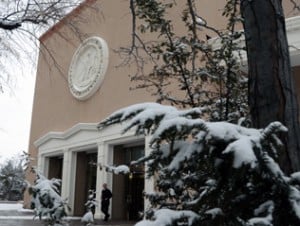
The Roundhouse in Santa Fe (Photo by Heath Haussamen)
While I’ve been in Santa Fe this week, I’ve been talking to people about the state budget and found that there are some interesting and, in some instances, unconventional dynamics in play.
For example, a Republican governor is proposing cutting government incentives for an out-of-state industry (the film industry). She’s also pushing smaller cuts in Medicaid than many lawmakers and proposing exempting teachers from employee increases to retirement plans.
On the flip side, it’s largely a group of Democrats who are opposing cuts to the film program based on the argument that the industry is creating economic development and boosting the state’s economy. And Martinez’s proposal to exempt teachers from increased pension payments is going nowhere in the Legislature.
Of course, it’s messier than that. There are Democrats supporting Gov. Susana Martinez’s attempt to cut the film program, and Republicans who don’t understand why she wants to chop an economic development program.
Not enough votes to pass the House
In the House, there’s no agreement on several sticking points in the budget, which is why it was referred out of the House Appropriations and Finance Committee, and then sent back from the House floor to the committee, and then tabled in the committee.
That’s where it currently sits, without the votes to pass the House.
The budget is stuck, even though a House rule sets a deadline for sending the budget to the Senate that passed earlier this week.
One sticking point is a that a group of progressive Democrats in the House don’t want to pass the budget as it currently exists because they don’t want to cut Medicaid – and some don’t want the Republican governor’s budget to slash Medicaid less than the budget approved by the Democratic-controlled House.
There are also some Democrats still trying to find a way to raise new revenues without calling it a tax increase that the governor is certain to veto.
The timing
The issue of timing is important because of why the rule about sending the budget to the Senate exists: It’s designed to move the budget through the process in time to force the governor to act before the session adjourns. That gives the Legislature time to override vetoes.
The delay in moving the budget may be necessary to build consensus, but it’s going to make it less likely that the Legislature will still be around to override vetoes. If the budget goes to Martinez more than three days before the end of the session, she has three days to act on it and the Legislature has time to override vetoes. But if the budget goes to the governor in the final three days of the session, she has 20 days to act.
Once the House approves the budget – which might happen as early as today (but don’t bet on it), it moves to the Senate Finance Committee. There, disputes between the House and Senate are likely to become clear publicly.
Then the bill goes to the Senate floor. Assuming the chambers pass versions of the budget that aren’t exactly the same – which is likely – then there’s a conference committee to reconcile differences.
So there’s a lot left to be done in the final couple of weeks of the session. The situation is likely to stay fluid for awhile.